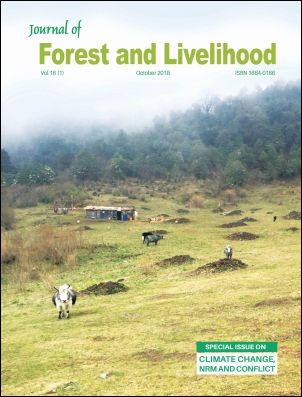Transforming Forest Conflicts: Learning from North-South Conflicts over Community Forests in Terai Region of Nepal
DOI:
https://doi.org/10.3126/jfl.v16i1.22879Keywords:
Action research, forest conflict, cooperation, Terai, transformationAbstract
Continued forest conflicts in Nepal’s Terai have not only undermined sustainable forest management in the region but have also contributed to emerging social unrest that can undermine transition towards new federal Nepal. Using an action research approach involving intensive participatory research methods, this paper shares experiences of current initiatives and their challenges in transforming forest-conflicts between the northern communities and southern communities in the Terai region of Nepal. The action research process helped bring the conflicting communities together, develop a shared understanding through participatory resource assessment and analysis of socio-institutional processes among the conflicting communities, and help devise a widely acceptable benefit sharing arrangement. Consequently, there has been a substantial reduction in conflict through an inclusive and extended governance arrangement. Consideration of traditional use of forests by distant as well as adjacent communities will be helpful to reduce potential heightening of conflicts in the face of policies that emphasises more on protection and restoration of forest as a response to historical trend of deforestation and emerging threats of climate change. Finally, we suggest that enabling policies including further devolution of forest management rights to local communities and adoption of adaptive approach to resource and institutional management can help mitigate northern communities-southern communities’ conflict in Terai.
Downloads
Downloads
Published
How to Cite
Issue
Section
License
CC-BY-NC: This license allows reusers to distribute, remix, adapt, and build upon the material in any medium or format for noncommercial purposes only, and only so long as attribution is given to the creator.





